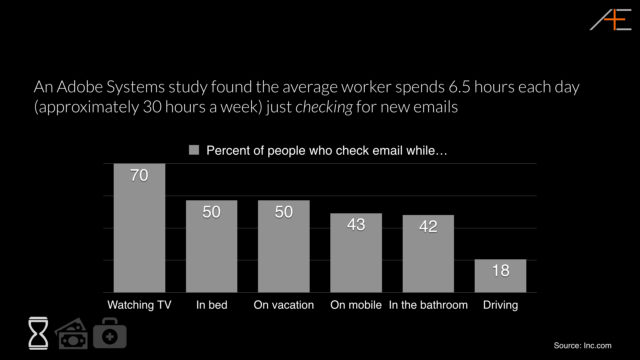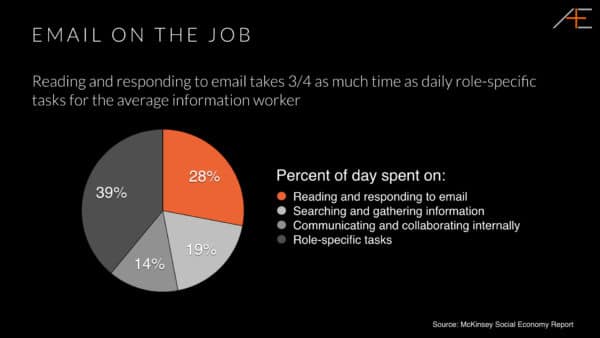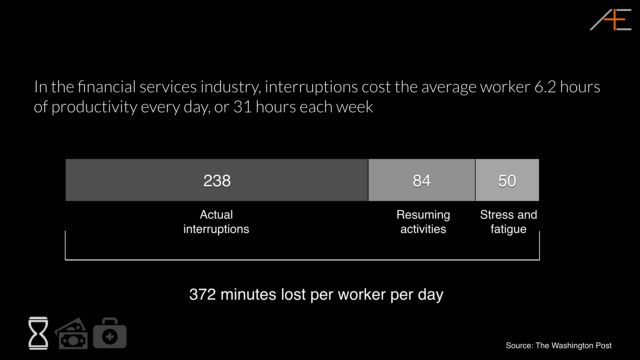Do you ever feel like you’re addicted to email?
Do you find it impossible to ignore checking your inbox?
Email is a known time-waster but a study from Adobe Systems suggests it’s worse than anyone thought.
It turns out that the average worker spends around 30 hours a week checking email.
Now this 30 hours we’re talking about here do NOT include the hours spent reading and answering the emails.

That 30 hours goes into simply checking to see if there’s a new email.
Here are a few inbox junkie signs to look out for according to Asianefficiency.com :
- you keep checking your email first thing in the morning and before you go to sleep
- whenever there’s a small window of time you’ll check if there are any new emails
- you check your email more than 3 times an hour
- you keep a browser tab or email client open at all times (and in the background)
By the way… You’re not alone.
A recent McKinsey Social Economic Report has found that the average knowledge worker spends almost 3/4 of their day on just email-related tasks.

So why is email so addictive?
Asianefficeinecy.com explains what has happened is that you might have conditioned yourself to seek pleasure from knowing you got an email.
explains what has happened is that you might have conditioned yourself to seek pleasure from knowing you got an email.
Remember the good old days when receiving an email was actually fun?
You might have gotten a personal email from your friend, spouse or your favorite company that was giving away free stuff. Today that’s totally different.
I don’t know anyone who now looks forward to checking their email.
It’s a not-so-fun necessity for work and doing business.
But there lies the problem.
Over time we’ve conditioned ourselves to keep checking email because sometimes we might get a reward for it.
That “ding” notification might give us something we like, such as praise, an interesting article, an amazing deal, or an email from someone we haven’t talked to in a while.
Sometimes it might give us something we don’t like (spam anyone?).
The variable rewards trigger a seeking behaviour that turns into a compulsive behaviour.
Research has shown that email notifications trigger a dopamine hit in our brain.
Dopamine is a neurotransmitter in the brain that regulates movement, emotion, cognition, motivation, and feelings of pleasure.
When email notifications make that ding noise, it stimulates that system which rewards our natural behaviours, produces the euphoric effects and teaches them to repeat the behaviour.
Our brains are wired to ensure that we will repeat life-sustaining activities by associating those activities with pleasure or reward.
Whenever this reward circuit is activated, the brain notes that something important is happening that needs to be remembered, and teaches us to do it again and again, without thinking about it.
That’s what’s happening to our brains.
You see this everywhere.
How often do you check your phone?
Why?
Because of possible rewards and pleasure you get from text messages (and email).
It’s the same with Facebook.
Again, this is not your fault.
Our bodies aren’t designed to handle email, text messages and Facebook notifications.
The reality is, the more notifications we get, the lower our productivity is
Each interruption costs 40 minutes of productivity.
The reality is, the more notifications we get, the lower our productivity is.
Each notification represents a loss of productivity.
Did you know that…
- it takes about 25 minutes to refocus after an interruption
- on top of that, you need another 15 minutes to get back in “flow”
So each interruption represents a loss of 40 minutes.

What Can You Do About This?
Asianefficiency.com explains that while you may think checking your email throughout the day and replying to emails within minutes makes you the most productive person in the world, you’re really just slowing yourself down, as well as those around you.
They suggest there are several things you can do today.
1. Turn Off Email Notifications
I know a lot of you will object to this and not do this.
I get it.
It seems impossible.
You might not do it, but I at least want you to know that this is the best option.
Maybe not as the first step but something to strive for.
The reason this is the best solution is that it immediately kills the dopamine trigger.
No random notifications means no dopamine hits.
You could always setup the VIP email filter.
That way you have the best of both worlds: you can still do deep work while at the same time quickly respond to people that matter to you.
2. Go from Push to Pull Notifications
The next tactic is to change the way you get notifications.
By default all apps and email service providers have the push mechanism turned on which means that you’ll get notified as soon as a new arrives.
Ideally, you change this to having pull notifications which means you’ll get notifications when you want them.
How do you know if you have push or pull?
If it automatically updates the number of unread emails and it notifies you of each new incoming email, that’s push.
Having pull notifications would mean that you would have to open the email app and hit refresh to see what the new emails are.
3. Delay the Notifications
 If you like the idea of turning off push notifications but you still need to keep checking email frequently in the background, then another solution would be to delay the notifications you get.
If you like the idea of turning off push notifications but you still need to keep checking email frequently in the background, then another solution would be to delay the notifications you get.
This is especially for people who have the habit of keeping their email client open all day long.
What you do is turn off the push notifications but set your email client to automatically refresh every 30 minutes.
That way you have the peace of mind knowing that you can always get back to people within 30 minutes while at the same time give yourself more time and space to focus.
Over time change it to 45 minutes. Then an hour. Then completely turn it off.
4. Changing Your Mindset
The above 3 tactics are great quick solutions but the long-term solution is the mind shift you will make.
Right now you’re being dictated by others.
The shift you want to make is to be the person who is in control of their time and attention.
The Bottom Line:
Clearly email notifications are a productivity killer.
And there’s a balance between being responsive over email and being able to focus and do the best work possible.
- 8 Charts explaining why we’re in for a great time in property in 2021 - January 5, 2021
- New data shows COVID-19’s impact on Australians’ personal finances, including debt and insurance - December 21, 2020
- 4 key reasons why the property pessimists are changing their minds - October 12, 2020









